2018 Lectures |
Lunch: 11:45 am
Lecture: 12:00 - 1:00 pm
Scott Hall Room 7370
540 E Canfield, Detroit, MI 48201
RNA Regulation in the Immune System
Mark Ansel, Ph.D.
Professor
Director, Biomedical Sciences Graduate Program
UCSF
Host: Qing-Sheng Mi
Henry Ford Health System
Department of Biochemistry, Microbiology and Immunology, Wayne State University
-
 Speaker Profile Speaker Profile
MicroRNAs, transcription factors, and epigenetic regulation shape the gene expression programs that determine cell identity and function. Dr. Ansel studies how these molecular mechanisms work together to control lymphocyte development, differentiation, and function in immunity. He uses in vitro cell differentiation systems, mouse genetics, disease models, and high dimensional cellular and molecular analyses in human biospecimens to unravel the regulatory networks that underlie immunity and immune pathology, especially allergy and asthma.
Dr. Ansel has authored many articles in eminent journals such as Nature, Nature Immunology, Immunity, Cancer Cell, Journal of Experimental Medicine and Journal of Clinical Investigation.
|
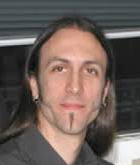
|
Lunch: 12:00 pm
Lecture: 12:15 - 1:30 pm
Hudson Webber Cancer Research Center, Second Floor, Wertz Auditorium
4100 John R. Street, Detroit, MI 48201
Immune Drug Discoveries at Pfizer
Thomas A. Wynn, Ph.D.
Vice President for Discovery
Pfizer
Host: Matthew Fountain
Department of Biochemistry, Microbiology and Immunology
Wayne State University
-
 Speaker Profile Speaker Profile
Dr. Wynn joined Pfizer in 2017 to lead the Discovery effort in the Inflammation and Immunology Research Unit in Cambridge, MA. Prior to joining Pfizer, he was a Senior Investigator and Chief of the Immunopathogenesis Section of the Laboratory of Parasitic Disease, in the National Institute of Allergy and Infectious Diseases, NIH in Bethesda, Maryland. Dr. Wynn received his Ph.D. from the Department of Medical Microbiology and Immunology at the University of Wisconsin at Madison. He has published over 200 research papers, reviews, and book chapters in many prestigious journals including Nature, Science, and Nature Immunology, and have made important contributions to our understanding of the role of cytokines and growth factors in the progression and resolution of chronic inflammation, tissue regeneration, and fibrosis. At Pfizer, Dr. Wynn is leading the discovery efforts in the areas of immune tolerance, epithelial cell biology, immunometabolism, innate immunity, and fibrosis. Dr. Wynn is a Fellow of the American Academy of Microbiology, and has won many prestigious international awards. For the past three years, he has been included on Thomson Reuters’ list of Highly Cited Researchers.
|
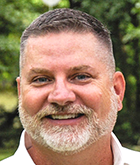
|
Lunch: 12:00 pm
Lecture: 12:15 - 1:30 pm
Hudson Webber Cancer Research Center, Second Floor, Wertz Auditorium
4100 John R. Street, Detroit, MI 48201
NKG2D Signaling Certifies Effector CD8+ T Cells for Memory Formation
- A New View of Memory Development
Jose Guevara-Patino, M.D., Ph.D.
Associate Professor of Surgery
Cancer Immunology Program
Loyola University
Host: Wei-Zen Wei
Department of Oncology, Wayne State University
Barbara Ann Karmanos Cancer Institute
Wayne State University
-
 Speaker Profile Speaker Profile
Dr. Guevara-Patino is an outstanding tumor immunologist who specializes in developing and improving T cell-based cancer immunotherapies. He had doctoral training at the National Institute for Medical Research (UK) and the University College London, and did postdoctoral research at the Momorial Sloan-Kettering Cancer Center with the renowned cancer immunologist Alan Houghton.
He has published many studies in leading journals, such as Nature Medicine, Science Translational Medicine, Journal of Experimental Medicine, and Clinical Cancer Research. His current work focuses on rejuvenating and sustaining anti-tumor T cell responses.
|
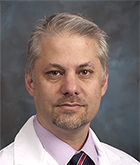
|
Lunch: 12:00 pm
Lecture: 12:15 - 1:30 pm
Hudson Webber Cancer Research Center, Second Floor, Wertz Auditorium
4100 John R. Street, Detroit, MI 48201
Antigen Recognition by T-Cell Receptor-Transduced T-Cells
Michael Nishimura, Ph.D.
Professor of Microbiology/Immunology and Surgery
Co-Director, Oncology Institute
Associate Director, Cancer Center Translations Research
Director, Immunologic Therapeutics Program
Loyola University
Host: Wei-Zen Wei
Department of Oncology, Wayne State University
Barbara Ann Karmanos Cancer Institute
Wayne State University
-
 Speaker Profile Speaker Profile
Dr. Nishimura is a highly-recognized leader in T cell biology and adoptive T cell therapy for treating cancer or viral infection. He guides clinical trials in advanced melanoma patients using MART-1 or tyrosinase specific T cell receptor (TCR)-transduced T cells. He further studies the mechanism of immune cross-priming induced by adoptive T cell therapy, toward enhancing the efficacy and durability of T cell therapy.
|
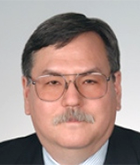
|
Lunch: 12:00 pm
Lecture: 12:15 - 1:30 pm
Hudson Webber Cancer Research Center, Second Floor, Wertz Auditorium
4100 John R. Street, Detroit, MI 48201
Decoding Tumor Cellular Heterogeneity with Digital Cytometry
Aaron M. Newman, Ph.D.
Assistant Professor of Biomedical Data Science
Stanford University
Host: Donovan Watza
MD/PhD Program, Wayne State University
Barbara Ann Karmanos Cancer Institute
Wayne State University
-
 Speaker Profile Speaker Profile
Dr. Newman's group combines computational and experimental techniques to study the cellular organization of complex tissues, with a focus on determining the phenotypic diversity and clinical significance of tumor cell subsets. His research cuts across disciplinary boundaries, with a focus on the development of robust computational strategies to address key questions in the cancer genomics field and an emphasis on clinical translation of his findings into novel biomarkers and individualized therapies.
Being a member of the Department of Biomedical Data Science and the Institute for Stem Cell Biology and Regenerative Medicine at Stanford, Dr. Newman's lab is also interested in the development of impactful biomedical data science tools in areas beyond their immediate research focus, including developmental biology, regenerative medicine, and systems immunology.
He is an author of many studies published in top scientific journals, such as Nature, Science, Nature Biotechnology, Nature Medicine, Nature Methods, Science Translational Medicine, Cell Stem Cell and Cancer Discovery.
|
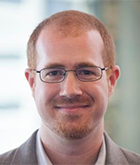
|
Lunch: 12:00 pm
Lecture: 12:15 - 1:30 pm
Hudson Webber Cancer Research Center, Second Floor, Wertz Auditorium
4100 John R. Street, Detroit, MI 48201
Deep Cell Phenotyping in Hematologic Malignancies Enabled by Mass Cytometry
Assistant Professor of Hematology
James Comprehensive Cancer Center
Ohio State University
Host: Jessica Back, Ph.D.
Microscopy, Imaging, and Cytometry Resources Core
Barbara Ann Karmanos Cancer Institute
Wayne State University
-
 Speaker Profile Speaker Profile
Dr. Behbehani graduated from the University of Cincinnati with an M.D. and a Ph.D. in Molecular Genetics, and completed residency in Internal Medicine at the University of Chicago and fellowship in Hematology and Oncology at Stanford University. He stayed at Stanford to complete a postdoctoral fellowship with Dr. Garry Nolan focusing on applying mass cytometry (CyTOF) to the characterization of clinical samples from patients with hematologic malignancies. Dr. Behbehani is an active clinician within the James Comprehensive Cancer Center, primarily treating patients with acute leukemia. His research at OSU is focused on utilizing single-cell deep functional phenotyping enabled by mass cytometry to characterize mechanisms of chemotherapy resistance and predict how novel therapeutic approaches may be optimally combined with current therapies to prevent treatment failures.
He is an author of studies published in several leading journals, such as Cancer Discovery, PNAS, Nature Protocols and Leukemia.
|
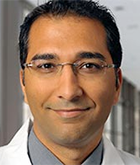
|
Lunch: 12:00 pm
Lecture: 12:15 - 1:30 pm
Hudson Webber Cancer Research Center, Second Floor, Wertz Auditorium
4100 John R. Street, Detroit, MI 48201
Interactions between the Immune and Metabolic Systems
Professor of Pathology, Microbiology and Immunobiology
Elizabeth and John Shapiro Chair
Vanderbilt University
Host: Li Zhou, M.D., Ph.D.
Henry Ford Health System
-
 Speaker Profile Speaker Profile
During his earlier career, Dr. Van Kaer has been a pioneer in the field of Natureal Killer T (NKT) cells in autoimmune diseases and immune therapies. In recent years, Dr. Van Kaer has focused on interactions between the immune and metabolic systems, especially the immunological functions of innate and innate-like lymphocytes in the development of obesity-associated metabolic diseases. A more recent research direction is the role of autophagy in the development and function of distinct immune cells.
Dr. Van Kaer received B.S. and M.S. degrees in Chemistry with high distinction from Ghent University in Belgium. In 1989, he received his Ph.D. degree in Genetic chemistry from the same University, with the highest distinction. After graduation, he had his 4 years’ postdoctoral training at the MIT under the mentorship of the Nobel Laureate Susumu Tonegawa. He then Joined the Department of Microbiology and Immunology of Vanderbilt University School of Medicine as an Assistant Professor, and was promoted to full professor in 2002.
Dr. Van Kaer has authored a large numbe of landmark papers in Cell, Nature Medicine and Immunity. He has received many awards for both his academic contribution and teaching. He also serves in the editorial board of many immunology journals.
|
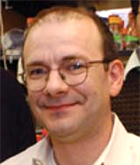
|
Lunch: 12:00 pm
Lecture: 12:15 - 1:30 pm
Hudson Webber Cancer Research Center, Second Floor, Wertz Auditorium
4100 John R. Street, Detroit, MI 48201
New Genetic Tools for Mouse Immunologists
Professor of Immunobiology
Director of the Immunobiology Program
University of Arizona
Host: Wei-Zen Wei, Ph.D.
Karmanos Cancer Institute
Wayne State University
-
 Speaker Profile Speaker Profile
Dr. Frelinger's research is focused on the production of antigen specific T-cells. While much of the work has been directed at virus and bacterial antigens, he also used similar approaches to inform immunotherapy in cancer. Dr. Frelinger published a series of papers on altered peptide ligand from an observation in HIV through its confirmation with the breast tumor epitope Her2/neu in humanized mice and then a clinical trial. He has been and continues to move basic science from the fundamental to the practical.
Dr. Frelinger was President of The American Association of Immunologists from 2010 to 2011 and served as an AAI Council member from 2005 to 2010. He was awarded the AAI Distinguished Service Award in 2003.
|
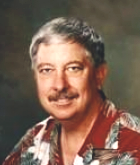
|
Lunch: 11:45 am
Lecture: 12:00 - 1:00 pm
Hudson Webber Cancer Research Center, Second Floor, Wertz Auditorium
4100 John R. Street, Detroit, MI 48201
Non-Cell-Intrinsic Mechanisms in the Control of Leukemia and Melanoma
Associate Professor
Department of Genetics
Yale University
Host: Qing-Sheng Mi, M.D., Ph.D.
Henry Ford Health System
-
 Speaker Profile Speaker Profile
Dr. Lu is one of the world's leading researchers in studying the mechanisms
of genetic regulation in normal and malignant hematopoiesis. His lab currently focuses on miRNA-mediated mechanisms in these processes, and also explores the relationship between clonal hematopoiesis and cancer immunity. Besides having an appointment in the Department of Genetics at Yale, Dr. Lu is also a core member of the Yale Stem Cell
Center, Yale Cancer Center, Yale Cooperative Center of Excellence in Hematology and Yale Center for RNA Science and Medicine.
Dr. Lu has published many articles in leading scientific journals, including Nature, Cell and Immunity.
|
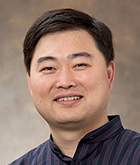
|










 Speaker Profile
Speaker Profile